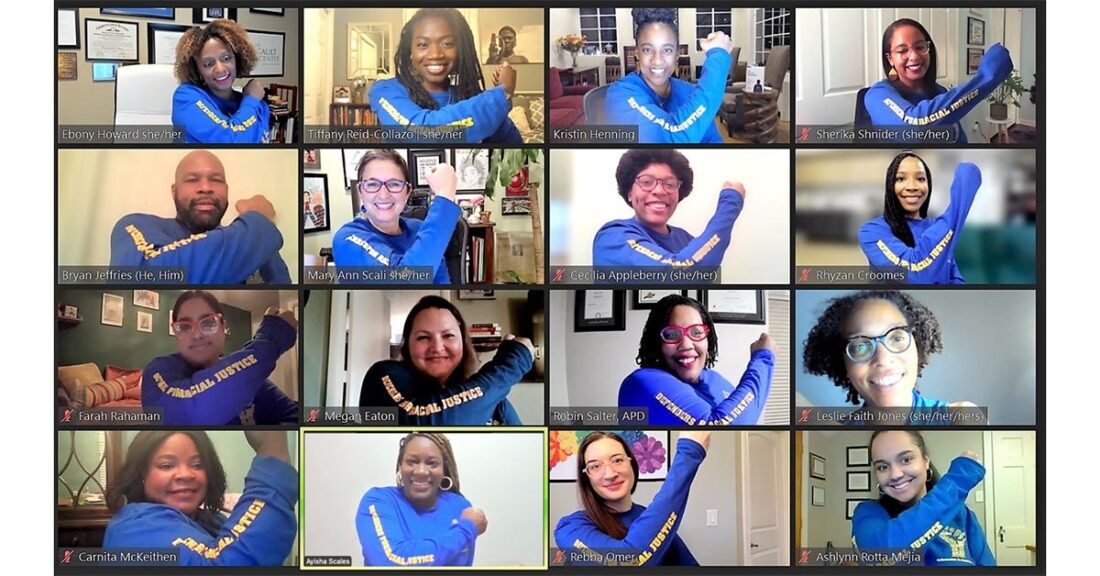Advocating for Racial Equity in Youth Justice

Defense attorneys selected in 2022 by Georgetown Juvenile Justice Initiative to participate as ambassadors
A program supported by the Annie E. Casey Foundation is preparing attorneys to advocate for youth of all races in the juvenile legal system and support equitable opportunities and outcomes for everyone.
The program, Ambassadors for Racial Justice, pairs defense attorneys partner with local organizations, government agencies and schools to host racial equity trainings and spearhead policy reform and public advocacy within their communities. With Foundation support, the program is training a new group of ambassadors — 10 attorneys in youth defense and related fields.
Extreme Disparities Persist in Youth Justice
Stark racial and ethnic disparities in youth justice have persisted despite more than 30 years of reform efforts to close these very gaps. In 2019, the latest year for which federal data are available, Black and Native American youth were far more likely to be confined in court-ordered out-of-home placements than other youth. Black youth were also more likely to end up in custody—over 16 times more likely than their Asian and Pacific Islander peers; four times more likely than their white peers; and three times more likely than their Hispanic peers.
Ambassador Farah Rahaman, a youth defender with the New Jersey Office of the Public Defender in Union County, understands this divide all too well. “I want to shine a light on the bifurcated youth legal system in my county,” says Rahaman, speaking about the experiences of her clients of color compared to those of their white peers. “I want to ensure that my clients are afforded the same opportunities and chances to make mistakes that their white counterparts are given.”
Ambassadors Making a Difference in Their Communities
As part of the program, ambassadors design and lead major projects, which represent a range of interests. For instance:
- Kelly Jones advocated for ending prosecutors’ discretion to directly file minor charges against young people in adult court.
- Kristen Rome facilitated externships to help more Black attorneys gain experience in youth defense work.
- Ana Tent promoted legislative efforts to divert youth who had experienced mental illness or trauma into therapeutic services without court intervention.
- Angeles Zaragoza created an academic and mentoring experience that enabled youth currently or formerly in custody to earn transferable college credits, expand their life skills, connect with credible messengers and participate in cultural events.
Another example: Ambassador Bryan Jeffries is working to revamp the mandatory legal training module for correctional officers in the juvenile justice system. His updated module will offer lessons on youth civil rights, due process, the traumatic effects of racial discrimination and the historically disparate effects of the juvenile legal system on youth of color.
The Advocates Behind the Ambassadors Program
Two groups — the Georgetown Law Juvenile Justice Initiative and the Gault Center — are sponsoring the Ambassador’s program. Key to its success are Professor Kristin Henning, director of Georgetown Law Juvenile Justice Clinic and Initiative, and Ebony Howard, deputy director of the Gault Center. Both leaders expect the program to forge a group of well-trained, diverse defenders who:
- represent the voices of all youth;
- challenge norms, policies and practices that harm youth of color; and
- systemically reform the juvenile legal system.
“Ebony Howard, Professor Henning and their colleagues at the Gault Center and Georgetown’s Juvenile Justice Clinic and Initiative recognize that defenders’ daily proximity to young people and courts positions them to design and execute bold strategies that institutionalize racial equity,” says Danielle Lipow, a senior associate with the Annie E. Casey Foundation’s Juvenile Justice Strategy Group. “The Ambassadors program provides defenders throughout the country with the tools they need to fulfill that vision.”
More Equity and Inclusion Resources for Juvenile Justice
Safely and significantly reducing rates of youth confinement





